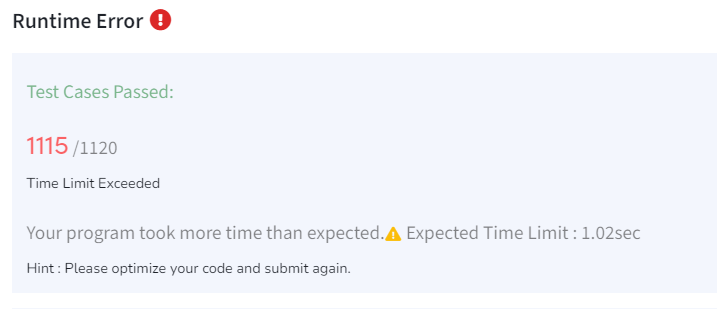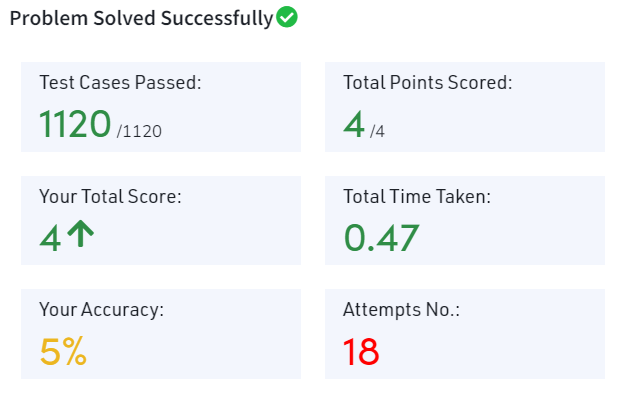题目
Given a number n, the task is to find out whether this number is a Smith number or not. A Smith number is a composite number whose sum of digits is equal to the sum of digits of its prime factors.
Example 1:
Input:
n = 4
Output:
1
Explanation:
The sum of the digits of 4 is 4, and the sum of the digits of its prime factors is 2 + 2 = 4.
Example 2:
Input:
n = 378
Output:
1
Explanation:
378 = 21*33*71 is a Smith number since 3+7+8 = 2*1+3*3+7*1.
Your Task:
You don't need to read input or print anything. Your task is to complete the function smithNum() which takes an Integer n as input and returns the answer.
Expected Time Complexity: O(n * log(n))
Expected Auxiliary Space: O(n)
Constraints:
\(1 \le n \le 10^5\)
解题过程
class Solution:
primes = [2, 3, 5, 7]
def primeFactors(self, n):
assert n >= 2
result = {}
for i in self.primes:
while n % i == 0:
n = n // i
result[i] = result.get(i, 0) + 1
if n == 1:
return result
# update primes, only function when `n > self.primes[-1]`
candidate = self.primes[-1] + 2
while True:
if all(candidate % i != 0 for i in self.primes): # not prime
self.primes.append(candidate)
while n % candidate == 0:
n = n // candidate
result[candidate] = result.get(candidate, 0) + 1
if n == 1:
return result
candidate += 2
def smithNum(self, n):
if n <= 1:
return 0
prime_factors = self.primeFactors(n)
if n in self.primes:
return 0 # it is a prime, so not smithNum
sum_digits = lambda k: sum(int(i) for i in str(k))
v1 = sum_digits(n)
v2 = sum(v * sum_digits(k) for k, v in prime_factors.items())
return int(v1 == v2)
我刚开始使用的方法是,用一个列表进行缓存,需要判断的数字比缓存的最大质数还大时,就找下一个质数(通过加2的形式)。
这个思路来自于一个“找第N个质数”的题目。
但是这个超时了,数字特别大时,这个会很耗时,因为每次加2只保证了不会装上2的倍数,对新的数字需要与所有已知的质数进行整除判断。

然后我就想到,有一个可以找到0-N内所有质数的算法。
但是这道题目里,没有指定范围,每次范围超出已知质数时,从0开始找也不太好。
于是我就改成了,如果数字大于缓存列表最大质数时,找到最大质数到这个数字之间的所有质数。相当于两个方法结合在一起,尽可能用到质数时再计算。
import numpy as np
class Solution:
def __init__(self):
# initial primes
self.primes = [2, 3, 5, 7]
self.last_num = self.primes[-1]
def primeFactors(self, n):
result = {}
if n <= 1:
return result
# try to simplify n with known primes
for i in self.primes:
while n % i == 0:
n = n // i
result[i] = result.get(i, 0) + 1
if n == 1:
return result
# update primes ranging from start to n
start = self.last_num + 1
candidates = np.ones(n + 1) # 0 to n
for p in self.primes:
k = int(np.ceil(start / p) * p)
while k < candidates.size:
candidates[k] = 0
k += p
new_primes = []
for idx, v in enumerate(candidates[start:]):
if v:
p = idx + start
new_primes.append(p)
k = 2 * p
while k < candidates.size:
candidates[k] = 0
k += p
self.primes.extend(new_primes)
self.last_num = n
# using new primes to simplify n
for i in new_primes:
while n % i == 0:
n = n // i
result[i] = result.get(i, 0) + 1
if n == 1:
return result
def smithNum(self, n):
if n <= 1:
return 0
prime_factors = self.primeFactors(n)
if n in self.primes:
return 0 # it is a prime, so not smithNum
sum_digits = lambda k: sum(int(i) for i in str(k))
v1 = sum_digits(n)
v2 = sum(v * sum_digits(k) for k, v in prime_factors.items())
return int(v1 == v2)

答案
看了看答案,思路是是先算出来一定范围内的所有质数,然后用这个表去计算。
和我的第二个思路比较像,不过我的第二个思路里,只有在需要时才计算新的质数,这个刚开始就找到所有质数。感觉见仁见智吧。
下面是根据答案改出来的可以提交的代码(默默吐槽一下,根本不是 Python 的代码风格……)。
不过,这个最后也超时了!我不知道是系统的原因还是Python语言的原因……
import math
MAX = 10000
primes = []
# utility function for sieve of sundaram
def sieveSundaram():
#In general Sieve of Sundaram, produces primes smaller
# than (2*x + 2) for a number given number x. Since
# we want primes smaller than MAX, we reduce MAX to half
# This array is used to separate numbers of the form
# i+j+2ij from others where 1 <= i <= j
marked = [0] * int((MAX/2)+100)
# Main logic of Sundaram. Mark all numbers which
# do not generate prime number by doing 2*i+1
i = 1
while i <= ((math.sqrt (MAX)-1)/2) :
j = (i* (i+1)) << 1
while j <= MAX/2 :
marked[j] = 1
j = j+ 2 * i + 1
i = i + 1
# Since 2 is a prime number
primes.append (2)
# Print other primes. Remaining primes are of the
# form 2*i + 1 such that marked[i] is false.
i=1
while i <= MAX /2 :
if marked[i] == 0 :
primes.append( 2* i + 1)
i=i+1
class Solution:
def __init__(self):
sieveSundaram()
def smithNum(self, n):
original_no = n
#Find sum the digits of prime factors of n
pDigitSum = 0;
i=0
while (primes[i] <= n/2 ) :
while n % primes[i] == 0 :
#If primes[i] is a prime factor ,
# add its digits to pDigitSum.
p = primes[i]
n = n/p
while p > 0 :
pDigitSum += (p % 10)
p = p/10
i=i+1
# If n!=1 then one prime factor still to be
# summed up
if not n == 1 and not n == original_no :
while n > 0 :
pDigitSum = pDigitSum + n%10
n=n/10
# All prime factors digits summed up
# Now sum the original number digits
sumDigits = 0
while original_no > 0 :
sumDigits = sumDigits + original_no % 10
original_no = original_no/10
#If sum of digits in prime factors and sum
# of digits in original number are same, then
# return true. Else return false.
return int(pDigitSum == sumDigits)
更多参考资料
Smith Number -- from Wolfram MathWorld
质数(素数)计算器 - 判断一个数是否为质数/素数
素数筛法算法及其原理 - kentle - 博客园